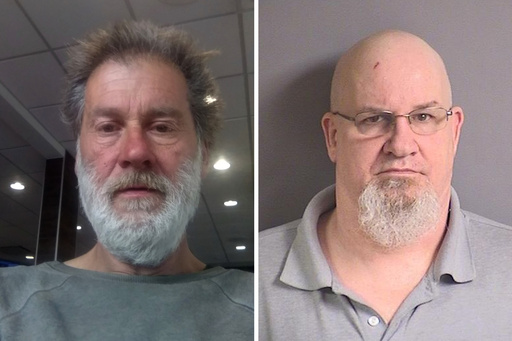
An information technology professional was sentenced to 12 years in federal prison on Friday after it was revealed he had been impersonating another individual for decades, leading to significant legal and psychological consequences for his victim. Matthew David Keirans, 59, from Hartland, Wisconsin, pled guilty last April to serious charges that included aggravated identity theft and providing false information to an institution insured by the National Credit Union Administration.
The actions of Keirans came as a shock to those who knew him, as family and friends expressed their disbelief in letters to the court, describing him as compassionate and reliable. In contrast, his victim, William Woods, expressed relief at the outcome of the case, viewing the guilty plea as a culmination of a long-running ordeal that had greatly impacted his life. Woods lamented that Keirans had attempted to shift the blame onto him, painting him as the true criminal in this situation.
Court documents reveal that Keirans had a challenging upbringing; he ran away from home at 16, committed a car theft in San Francisco, and was arrested in Oregon without ever facing charges. The two individuals first crossed paths in the late 1980s while working together at a hot dog cart in Albuquerque, New Mexico. According to Woods, in 1988, Keirans stole his wallet but returned it after Woods issued a threat. However, during that time, Keirans used Woods’ social security details to obtain a driver’s license under Woods’ name.
After that incident, Keirans seemingly vanished from public records under his original identity and adopted Woods’ name shortly thereafter. Over the years, he lived a double life, marrying and having a child while using Woods’ identity to secure significant loans—reportedly exceeding $200,000 in value—at a credit union in Iowa. Meanwhile, Woods struggled financially, earning only about $3,000 annually and was not on the radar financially.
In 2015, the situation took a turn when YouTuber Yousef Saleh Erakat, recognized online as FouseyTube, discovered Woods living on the streets. Erakat produced a series of widely viewed videos showcasing his help to Woods, giving him food and funding a motel stay. With the funds he received, Woods obtained a credit-monitoring service that revealed a startling reality: an individual was accumulating debts and opening accounts under his name without his consent.
When Woods confronted the situation at a bank in Los Angeles in 2019, he was met with disbelief. The bank’s security protocols relied on information set by Keirans, causing Woods to fail security questions. Rather than helping Woods, the bank called the police, leading to Keirans falsely portraying himself as Woods, asserting that no one had permission to access his accounts. This incident resulted in Woods being wrongfully charged with identity theft and false impersonation.
In his defense, Keirans’ attorney argued that Woods was attempting to defraud Keirans, portraying Woods as deserving of less sympathy due to previous wrongdoing. However, courtroom records mistakenly identified Woods as “Matthew Kierans,” misjudging the victim’s identity. Woods attempted to clarify his identity by naming his relatives and even proposing to contact the owner of the hot dog cart for verification, but authorities rejected his pleas for assistance.
Ultimately, a California judge declared Woods not mentally competent to stand trial, sending him to a mental hospital where he was administered psychotropic medications. His ordeal in jail lasted 428 days, along with 147 days in a mental facility, and concluded when he accepted a no-contest plea—an agreement subsequently vacated. Following his release, Woods initiated efforts to reclaim his identity, filing numerous reports and reaching out to the University of Iowa Hospital, where Keirans had been employed.
When confronted about his actions, Keirans initially claimed Woods needed to be committed but was later confronted with DNA evidence validating Woods’ identity through his biological father. Upon hearing the results, Keirans remarked, “My life is over.”
Now, Woods has returned to Albuquerque, where he works in landscaping, with aspirations to seek compensation for the injustices he endured. He expressed his determination to focus on rebuilding his life, stating, “My main goal is to rebuild my life.”

